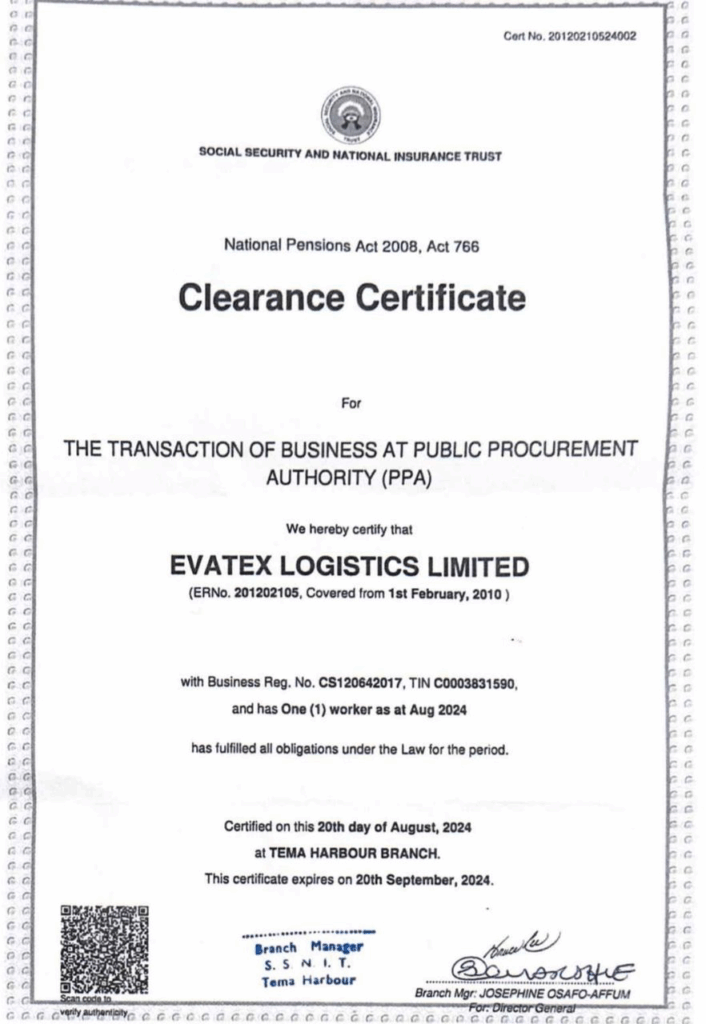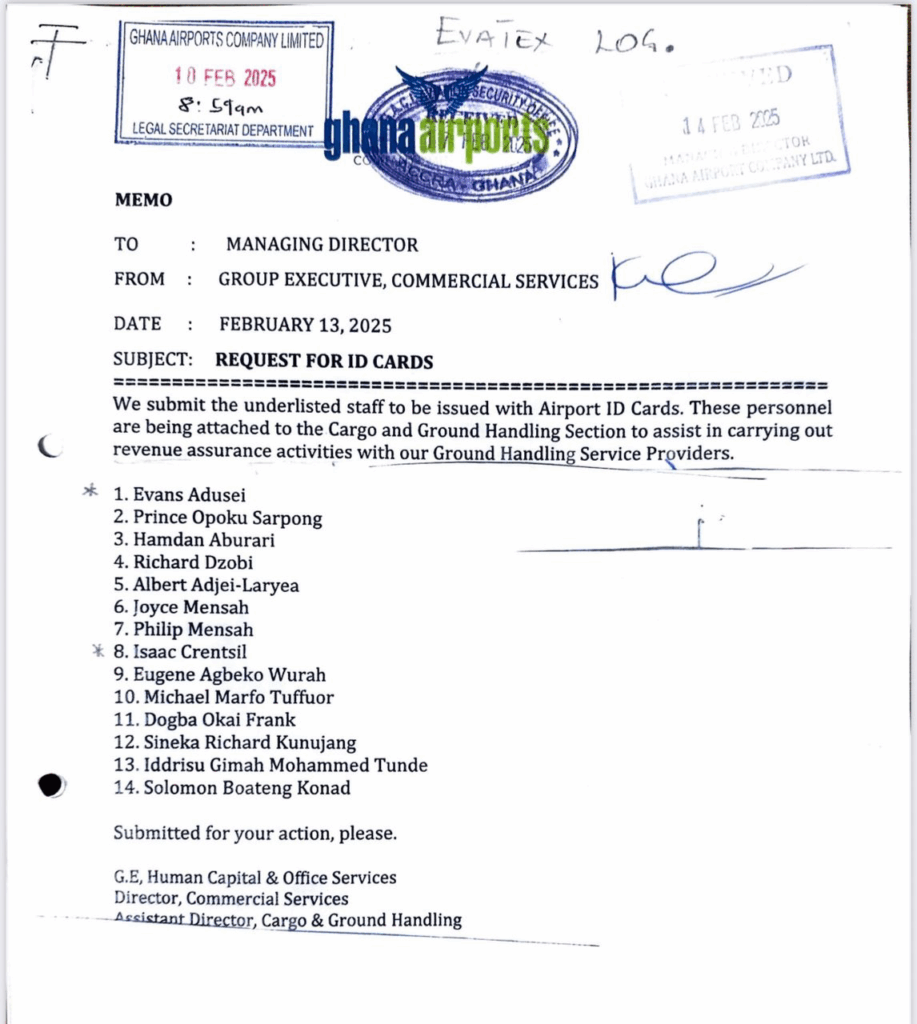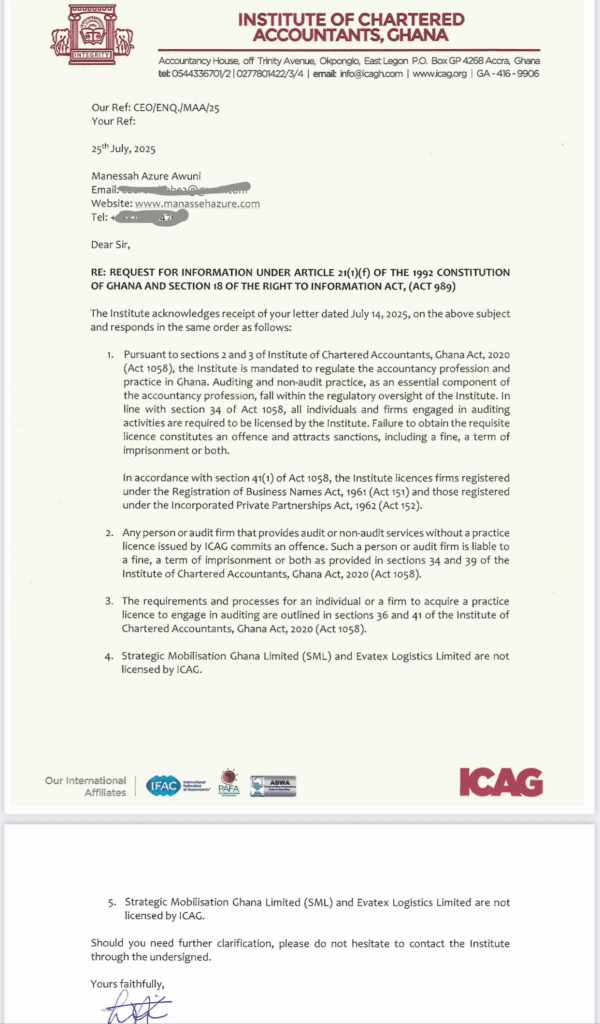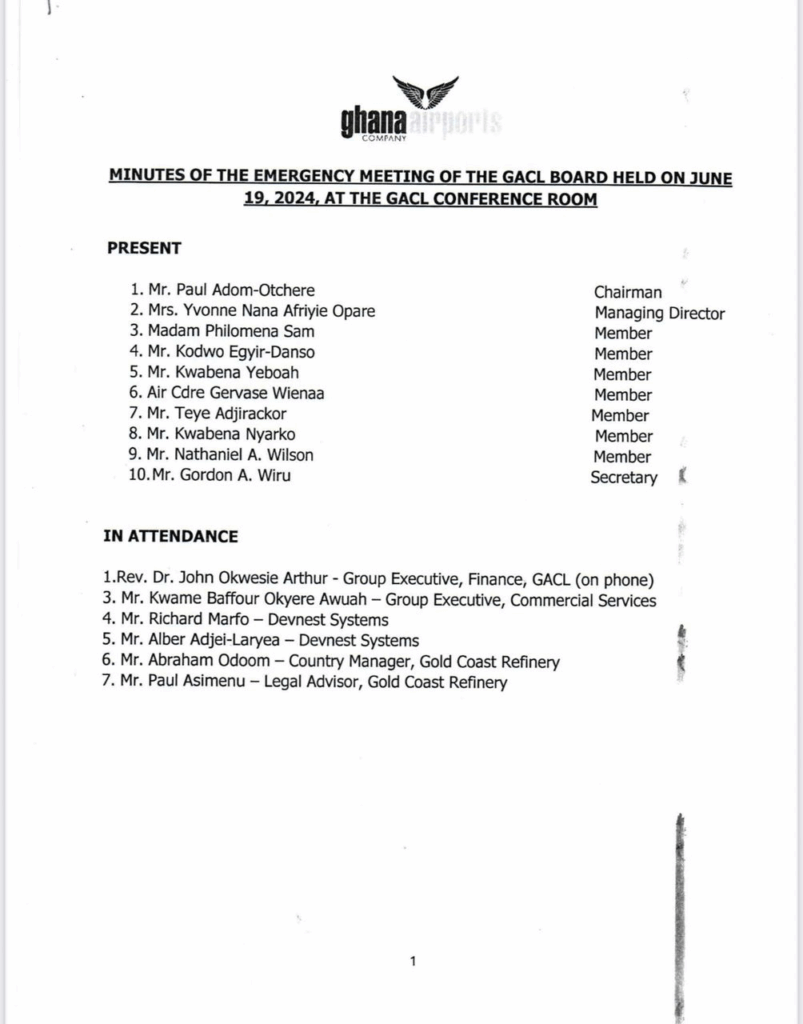SML’s Hidden Activities at Kotoka International Airport: The Full Story

Just three days before Ghana’s December 2024 election, the Ghana Airports Company Limited (GACL) entered into a revenue assurance and auditing agreement with Evatex Logistics Limited—a firm primarily engaged in mining and stevedoring and with no documented history in financial auditing.
While the contract bears a pre-election date, emerging evidence strongly suggests it was formalized only after the New Patriotic Party (NPP) had lost office. This timing has prompted concerns over whether the documentation was deliberately backdated to conceal its post-election execution.
Former GACL board chairman Paul Adom-Otchere has confirmed that he introduced Evatex to the negotiations and acknowledged that the decision-making process began at the board level, indicating high-level involvement in selecting the company.
The managing director of GACL, Yvonne Nana Afriyie Opare, defended the choice by citing insufficient internal resources—both in manpower and time—to carry out the audit. However, this rationale appears questionable: GACL currently employs 1,580 staff members, and its Audit, Risk Management and Compliance Department alone consists of nine employees (eight permanent staff and one national service staffer). By contrast, SSNIT records show that Evatex employs only a single person—an admission included in the firm’s own contract submission.
These disparities cast doubt on whether GACL genuinely lacked internal capacity or if the audit permit was used as a pretext to engage a politically linked contractor. Especially when firms with a strong track record in revenue assurance are available locally, awarding such a critical contract to a virtually non-existent business raises red flags.
The secrecy and questionable timing of the deal echo past controversies—most notably the SML-GRA revenue assurance contract, which spurred intense public outcry and prompted a presidential directive for a full review. Like that case, the Evatex contract highlights troubling patterns in procurement practices that invite political influence and opacity.
Given the strategic importance of aviation revenue verification, outsourcing this function to a company without relevant qualifications is particularly problematic. The move potentially undermines the objectives of transparency and accountability that the contract purported to uphold.
Civil society groups and anti-corruption advocates are now calling on Ghana’s new government to launch a thorough examination. They argue that contracts finalized at the tail end of an outgoing administration—especially those vulnerable to political exploitation—should be scrutinized, and, where necessary, annulled.
Until more detailed disclosures are offered, the Evatex deal remains a symbol of procurement vulnerability. How a contract of national consequence was entrusted to a nearly non-existent firm—with no aviation or auditing credentials—continues to raise critical questions about the integrity and oversight of Ghana’s public procurement system.

A deeper investigation has uncovered that Evatex Logistics Limited—the firm controversially awarded a revenue assurance contract by the Ghana Airports Company Limited (GACL)—is directly tied to Strategic Mobilisation Ghana Ltd. (SML), the company at the center of a US$141 million auditing and revenue assurance deal with the Ghana Revenue Authority (GRA) and the Ministry of Finance.
Our findings confirm that Evatex is not merely affiliated with SML—it is effectively a shadow extension of it. Despite intense public and media scrutiny surrounding SML’s original contract, which saw the company’s scope expanded to include the upstream petroleum and gold mining sectors under former Finance Minister Ken Ofori-Atta, the firm managed to quietly re-enter the public contracting space—this time under a new name and in a new sector.
The original SML deal was structured to guarantee over US$100 million in annual revenue for five years, with an option for automatic renewal—sparking national concern and multiple investigations. Even while those inquiries were ongoing, SML resurfaced under the guise of Evatex, securing a revenue assurance contract at Kotoka International Airport without going through any competitive bidding or making a formal presentation to the GACL board.
The lack of transparency surrounding Evatex’s selection has raised red flags among governance and policy experts. Ben Boakye, Executive Director of the Africa Centre for Energy Policy (ACEP), described the circumstances of the contract award as “bizarre and deeply concerning.”
Key evidence suggests Evatex is not an independent entity. For instance, the email address listed on the company’s website—evatel@ghana.com—is identical to that found on the website of Evans Timbers Limited, the registered parent company of SML.
Records from the Office of the Registrar of Companies (ORC) further confirm that both Evatex and SML share the same beneficial owner: Evans Adusei. Adusei serves as the Chief Executive Officer of both companies and was the signatory on the Evatex contract with GACL.
Moreover, documents submitted to the Ghana Airports Company as part of the contract staffing list reveal that several of the named Evatex personnel are in fact senior employees at SML. These include:
-
Hamdam Abubakar, Head of Engineering at SML,
-
Prince Opoku Sarpong, Head of IT at SML,
-
Philip Jude Mensah, former GRA Head of Legal and now with SML, who also witnessed the contract signing, and
-
Isaac Crentsil, former Customs Commissioner and now General Manager at SML.
These names underscore the extent to which SML used Evatex as a proxy to secure the airport contract under a new label. In essence, the very same company that faced a national outcry over its GRA and Ministry of Finance deals re-entered the public procurement space, bypassing scrutiny and due process, and effectively disguised as a different business.
The implications are troubling. Not only does this arrangement raise serious questions about procurement integrity at GACL, but it also points to a potential revolving door between high-level public servants and private entities benefiting from state contracts. With a number of former senior GRA officials now occupying strategic roles within SML—and subsequently Evatex—it appears the company has positioned itself as a lucrative landing zone for ex-regulators, blurring the lines between public oversight and private gain.
This development underscores the urgent need for robust conflict-of-interest checks, transparency in public contracting, and more vigilant enforcement of procurement laws to safeguard public resources and trust.

Civil society voices, including Ben Boakye of the Africa Centre for Energy Policy, have accused SML of hiding behind its affiliate, Evatex Logistics, to secure a lucrative contract at the Ghana Airports Company Limited (GACL).
“Their behavior suggests they lack confidence to compete openly,” Boakye remarked.
“If they truly believed in their capability, why disguise as another entity to win government projects?”
But the SML–Evatex connection is just the tip of the iceberg. A flurry of potential procurement violations, governance concerns, and misrepresentation issues are now under scrutiny.
Conflicting Testimonies on Awareness
GACL Managing Director Yvonne Nana Afriyie Opare claimed she was unaware of any SML–Evatex link at the time of contracting. However, former GACL Chairman Paul Adom‑Otchere painted a different picture—referring to Evatex as “the SML people” in an off-the-record conversation with our team.
Adom‑Otchere also claimed that SML CEO Evans Adusei appeared before the board during the proposal phase. Yet insiders confirm no such presentation took place—another firm pitched its capacity, but the contract was awarded to Evatex, an SML affiliate.
Even more troubling, close associates of Adusei deny his presence at the board meeting altogether, raising doubts about Adom‑Otchere’s recollection and the narrative he presented.
Prior Engagement with SML
The timeline deepens when Adom‑Otchere acknowledged publicly that he visited SML offices shortly after the December 2023 expose that sparked national attention. He told viewers on Good Evening Ghana that he and his team were sufficiently impressed with what SML’s management shared.
Despite that earlier contact, GACL’s management process was supposedly bypassed when it came to Evatex—the contract discussions began at board level, an uncommon internal practice.
Board-Level Introduction Raises Eyebrows
Multiple GACL insiders confirm that Adom‑Otchere brought Evatex into the board’s deliberations. When asked directly if he introduced the firm, Adom‑Otchere neither denied nor confirmed. Instead, he referenced Section 188(2)(b) of the Companies Act—prescribing that directors may convene board meetings with proposed agendas through the company secretary.
But calling a board meeting is one thing—effectively orchestrating a contract award to an unqualified company is another. Evatex lacks the licensing or regulatory approval required to conduct revenue assurance and auditing services.
No Qualifications, No Competition
Despite possessing neither certification nor direct experience in auditing, both Evatex and its parent, SML, were entrusted with a contracting assignment that requires high professional standards. The question remains: why bypass clear procedures for firms that specialize in revenue assurance?
Evatex formally began work at Kotoka International Airport in April 2025. Although the company has not yet received any payments, the circumstances of its contract awarding suggest malpractice.









Its like you read my mind! You appear to know so much about this, like you wrote the book in it or something. I think that you could do with a few pics to drive the message home a bit, but other than that, this is wonderful blog. A great read. I’ll definitely be back.